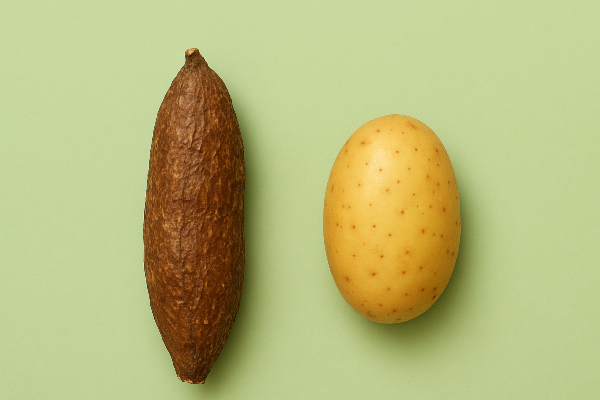


Cassava (also known as cassava or yuca) and potatoes are among the most popular sources of starch worldwide – but: Which one makes more nutritional sense? We compare both root vegetables and show when which one suits your goals better.
What is suitable for which nutritional goals?
| Nutrition Goal | Recommendable | Why? |
|---|---|---|
| Energy requirement high / weight gain | Cassava | Very high in calories and carbohydrates |
| Calorie Control / Weight Loss | Potato | Fewer calories, more satisfying per kcal |
| Blood sugar regulation / diabetes risk | Potato | Less glycemic – extra chilled |
| Vitamin supply (A, E, folate) | Cassava | Significantly higher grades |
| Mineral supply (potassium, iron) | Potato | Rich in important minerals |
| Gut health (resistant starch) | Both | Especially cassava + chilled potato |
| Gluten-free / low allergen | Both | Both are gluten-free |
Result
Both root vegetables have their special advantages: cassava offers more energy, certain vitamins and minerals - ideal for high requirements or as a nutrient booster. Potatoes score with fewer calories, more protein, water and minerals - perfect for healthy everyday food. The healthiest choice? Use variety! Combine both in your diet – the strengths complement each other perfectly.
Sources at a glance
Wikipedia: Cassava / Cassava – Nutrient Data, Risks Wikipedia
Wikipedia: Potato – Nutritional Value & Glycemic Index Wikipedia
FoodStruct: Vitamin & Mineral Comparison Cassava vs. Potato Food Struct
Verywell Health: Starchy Vegetables & Resistant Starch, GI Effects Verywell Health
Healthline: Calories, Health Benefits & Risks of Cassava Healthline
We use cookies to enhance your browsing experience, deliver personalized content, support your wellbeing journey, and help us understand how our content benefits our community. You can choose to accept or reject all cookies.
For more information about the cookies we use and how we handle your personal data, please see our Privacy Policy.
© Booonjour!
Developed and Maintain By ACMEUNIVERSE i-TECH